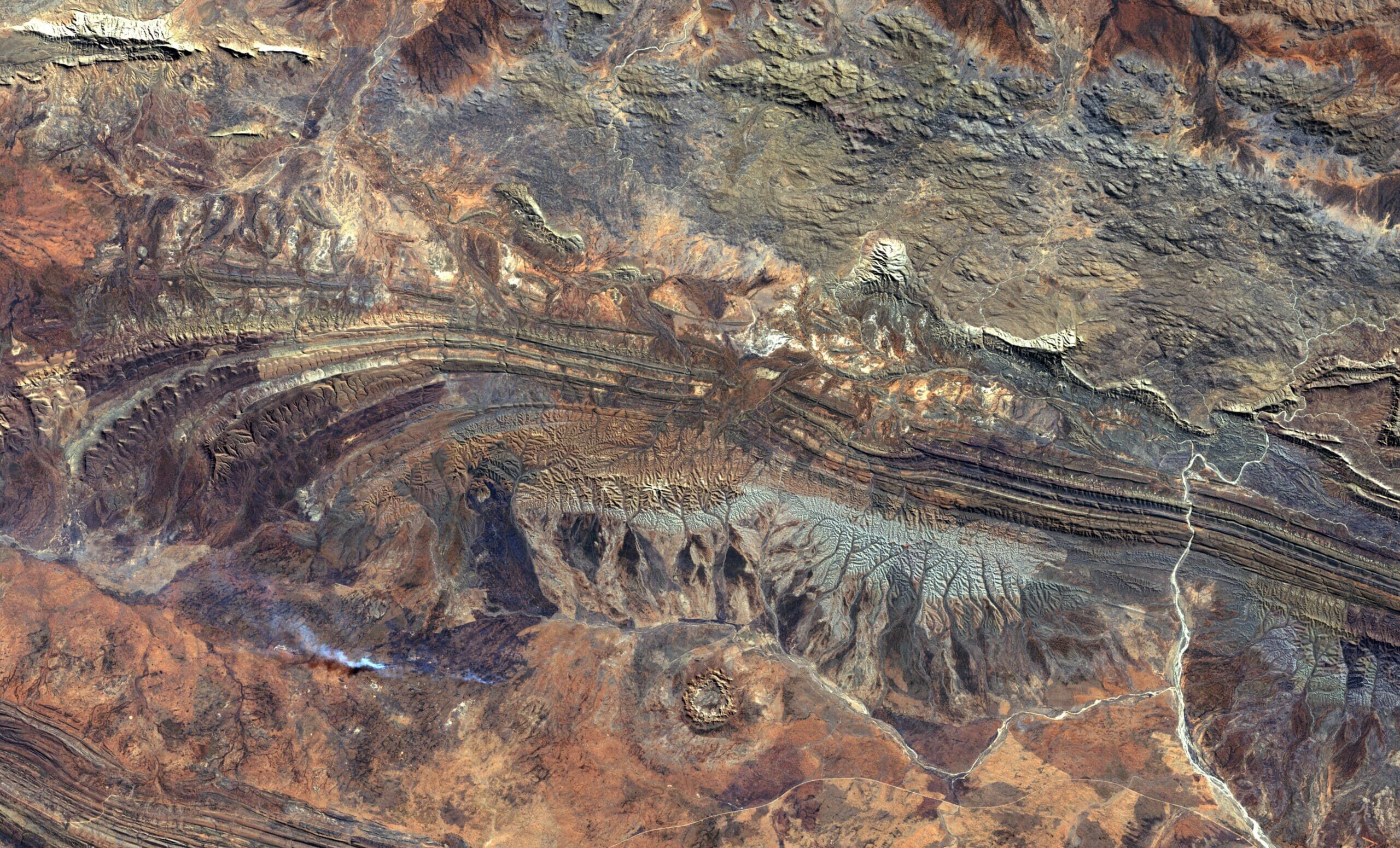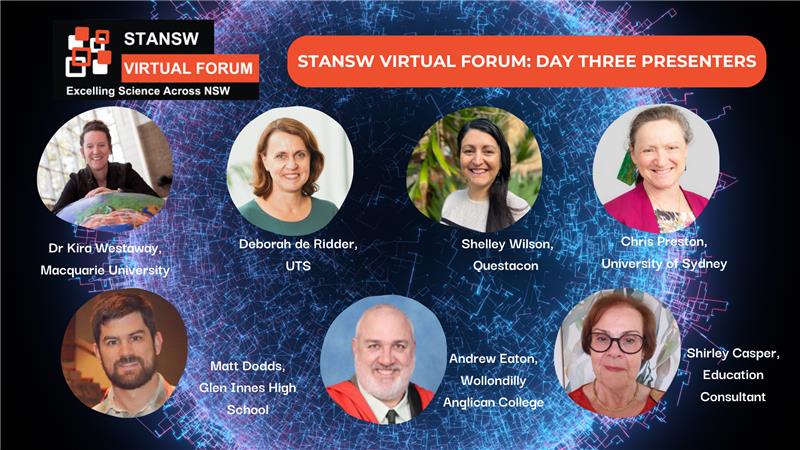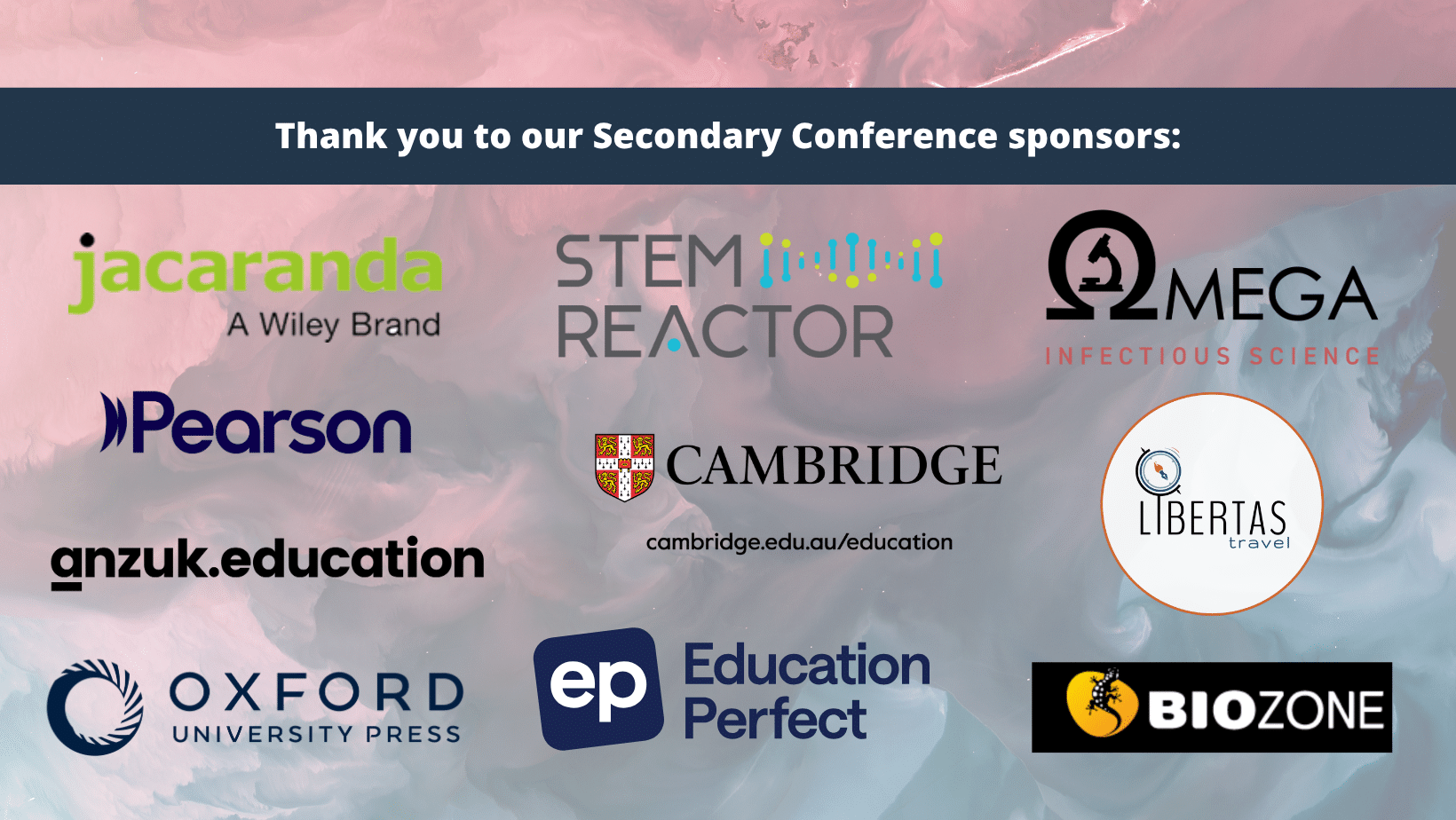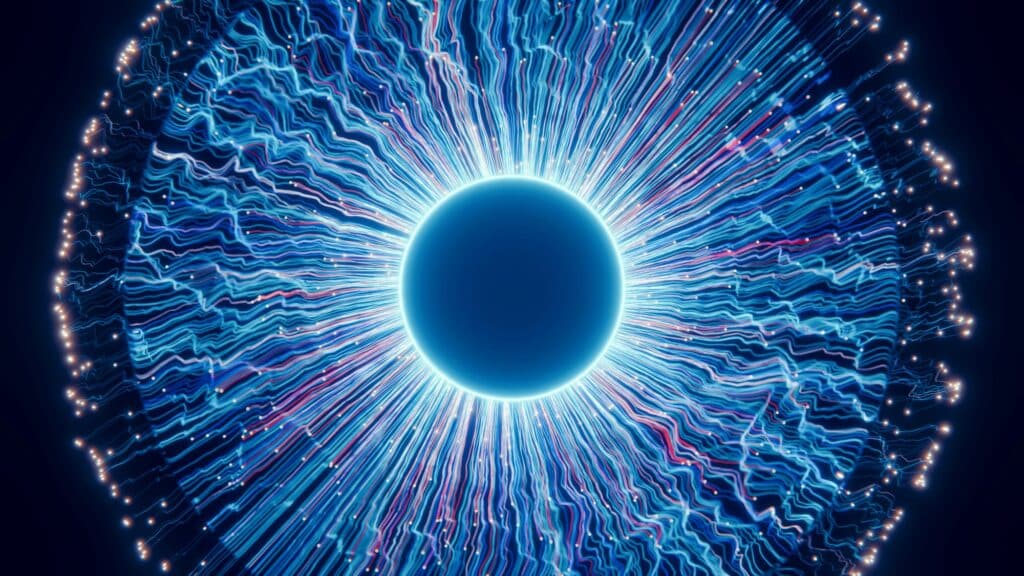
- This event has passed.
2025 Virtual Forum: Excelling Science across NSW – Day 3
16 September, 2025 @ 4:30 pm - 6:30 pm AEST

Virtual Forum Day 3
Tuesday 16 September, 4.30pm – 6.30pm
The STANSW 2025 Virtual Forum: Excelling Science across NSW is a professional learning series accessible to all science teachers across NSW. It is in a virtual format designed with regional and remote science teachers in mind. Spread over four flexible online sessions in September, this forum supports K–10 and Stage 6 educators with a strong focus on the new NSW Science syllabuses.
Join us at the Virtual Forum for:
- Accessible, high-quality professional learning for NSW science teachers.
- A diverse mix of workshop highlights from STANSW’s K–10 and Secondary Conferences in a virtual format, alongside new contributions from regional presenters.
- Guidance on science syllabus changes through sessions on pedagogy, assessment, practical investigations, depth studies, content progression, and working scientifically skills.
Virtual Forum Day 3 Program for Primary and Secondary
Attend your chosen session in each block, and get access to the other recordings on-demand!
Block 1: 4.30pm – 5.10pm
PRIMARY
- Merge Cubes: Holding the World in Your Hand, Kira Westaway, Senior Lecturer, Macquarie University
Explore the power of Augmented Reality in science education using Merge Cubes and the Merge Explorer app. Kira will guide you through simple and engaging activities that visualise the solar system, plate tectonics, volcanoes, and the human body – bringing abstract concepts to life in the palm of your hand. This session will show how Merge Cubes can promote student agency and excitement in learning. Please download and print the Merge Cube template before the session. Kira Westaway is a Senior Lecturer at Macquarie University with expertise in science communication and innovative educational technologies.
- Embodied Learning in Primary Science: Invertebrates and Animals Groupings, Presented by Christine Preston and Preservice Science and Technology Specialisation students, University of Sydney
Consider how to support primary students to develop deep understanding about science concepts by using their own bodies as a form of representation. Students will provide an overview of research on embodied learning, identify critical concepts in the topics—such as sense organs, body systems, light, heat, electricity—and demonstrate practical examples of embodiment. Participants will have the opportunity to discuss the affordances of embodied learning approaches.
ES1: Grouping Animals, Presented by Alexis Laosy, Jade Nguyen, Yasmin Safvat
We explore how young children can group animals focusing on their observable characteristics. Embodied learning strategies are used to help children recognise and remember key features.
S2: Invertebrates vs Vertebrates, Presented by Daven Candia, Rida Khan, Joanne Nguyen, Vi Nguyen
This Stage 2 workshop introduces to students the topic of vertebrates and invertebrates. Using games, charades, and discussions, students will explore how these animals move on land, in water, and in the sky. Activities are designed to expose and challenge common alternative conceptions.
K-12 (New Session Added)
FutureYou: Inclusion, Equity and Engagement in STEM classrooms, Hilary Schubert-Jones
Educators will discover practical strategies in this workshop to design inclusive STEM classrooms that welcome and support diverse learners. Using the free to access Future You program – an evidence-backed, research-based resource out of UNSW – participants will explore ways to challenge stereotypes, address misconceptions, and dismantle biases that can limit student engagement in STEM. Through real-world examples and adaptable activities, the session will focus on engaging underrepresented groups in STEM learning and inspiring them to see themselves in future STEM careers. Teachers will leave equipped with tools to foster equity, spark curiosity, and create student-centered learning environments where every child feels valued, capable, and excited to explore the possibilities of STEM
SECONDARY
- Depth Studies: Developing Expert Pedagogical Approaches, Deb DeRidder, PhD, University of Technology Sydney
Session has been withdrawn
This session shares findings from recent NSW research into effective teacher practices in Stage 6 Depth Studies. Deb will present a model of practice for scientific inquiry that supports planning, differentiation, and professional judgement in the classroom. Participants will be invited to reflect on their current practices and explore new ideas for implementing guided Depth Studies across Stages 4–6. Deb DeRidder is a former secondary science teacher and STANSW Council member. She recently completed her PhD focused on Depth Study pedagogy and has presented her work internationally to support teacher practice.
- Falling for Forces: Investigations with Everyday Materials, Shelley Wilson, Regional Leader NSW, Questacon
Discover how to explore force concepts using everyday classroom items through demonstrations, hands-on activities, and design projects. Shelley will outline core vocabulary and key concepts—such as gravity, air resistance, and force diagrams—aligned with both the incoming and outgoing K–10 syllabuses. The session will also demonstrate real-world applications and STEM links. Shelley Wilson is a civil engineer and experienced STEM educator. As Questacon’s NSW Regional Leader, she works with schools and communities to build capacity and inspire equitable access to STEM education across Australia.
Networking: 5.15- 5.45pm
Choose between the following networking themes: Primary, Connecting Head Teachers, Connecting Early Career Teachers, Connecting Regions , Connecting Out of Field Science Teachers, Connecting Subject Specialists.
Block 2: 5.50pm – 6.30pm
PRIMARY
- Developing Investigative Techniques, Shirley Casper, Education Consultant
This session explores how to support students in forming testable questions and developing scientific investigations. Shirley will introduce a model that builds from student curiosity toward structured inquiry, aligned with syllabus expectations. Participants will come away with ideas to scaffold scientific thinking in K–6 classrooms. Shirley Casper has taught across primary, secondary, and tertiary settings. She was a key developer of the K–6 Science and Technology syllabus and has authored over 60 STEM activities for primary teachers.
- Embodied Learning in Primary Science: Forces and Light, Presented by Chris Preston and Preservice Science and Technology Specialisation students, University of Sydney
This workshop explores topics in the New K-6 syllabus and showcases how to support primary students to develop deep understanding about science concepts by using their own bodies as a form of representation. Students will provide an overview of research on embodied learning, identify critical concepts in the topics, such as sense organs, body systems, light, heat, electricity, and demonstrate practical examples of embodiment. Participants will have the opportunity to discuss the affordances of embodied learning approaches.
S1 – Forces, Presented by Husna Ahmed, Mashia Yousuf, Kisa Zehra
Stage 1 students can explore push and pull forces through embodied learning. Body experiences can connect to science ideas such as the impact of forces (start, stop, change direction of movement). We aim to deepen understanding, support memory, and encourage active meaning-making through doing, feeling and dialogue.
S1 – Light, Presented by Idallia August, Sophia Hardas, Zoe Khayat, Poppy Newton
This presentation explores how light interacts with transparent, translucent, opaque and reflective materials through embodied learning. We model how children’s
emergent ideas can help develop science vocabulary and conceptual understanding about how light passes through, bounces off or is blocked by materials.
SECONDARY
- Depth Studies in Senior Physics: Using Assessment to Foster Creativity, Matt Dodds, Physics Teacher, Glen Innes High School
Matt shares how he delivers two engaging Physics Depth Studies that build skills and creativity. In Year 11, students conduct a Rocketry project using CAD tools to design and test their rockets. In Year 12, they create a working teaching tool based on Electromagnetism and present their work via video. Both tasks encourage innovation, autonomy, and deep understanding. Matt Dodds is an enthusiastic Physics teacher who champions practical learning and student-centred assessment. His creative approach has increased both engagement and Physics enrolments at his school.
- Design Your Own Depth Study, Andrew Eaton, Science Coordinator and Senior Chemistry Teacher, Wollondilly Anglican College
This session provides a framework for designing open-ended Depth Study tasks in senior science. Andrew will guide participants through strategies to maintain academic rigour while promoting student agency. The focus is on planning studies that are both manageable and meaningful. Andrew Eaton is a veteran Chemistry teacher and Science Coordinator with over two decades of classroom experience. He is also a contributor to the Catholic Trial Chemistry papers and supports quality assessment design in science education.
Mark your diaries, tickets available per day:
- Day 1 (as above): Tuesday 2 September, 11am – 1pm (Secondary)
- Day 2: Wednesday 10 September, 1pm – 3pm (Secondary)
- Day 3: Tuesday 16 September, 4.30pm – 6.30pm (Primary & Secondary)
- Day 4: Wednesday 24th September, 4.30pm – 6.30pm (Primary & Secondary)

| Ticket Price includes gst/ each | |
|
| Full Price | $240 | |
| Secondary School Members | $120 | |
| Individual Teacher Members |
$90 | |
| Primary Teacher Non-Members | $65 | |
| Primary Teacher Members | $45 | |
| Student Members | $20 |
* Individual Teacher Member Tickets include: Life Members, Secondary Teacher Members, Non-Teacher Members and Student Members.
* Primary Teacher Member Tickets include: Primary Teacher Members, Primary School Members and Students Members.
To access member tickets, please log into your member account.
Not a member yet? Join our community to access member discounts and access to other STANSW benefits.
Registration Closes: Tuesday 9 September, 2025. Payment must be received prior to the event date.
Online registrations are now closed. Please contact us on 02 9763 2751 for phone registrations.
STANSW is a NESA recognised PD provider. Attendance at this conference can be logged as up to 2hours of PD as part of NESA maintenance and accreditation requirements.
Standards Addressed: 2, 3 and 5, 6 and 7.
View Full Program

Details
$45.00 – $240.00



